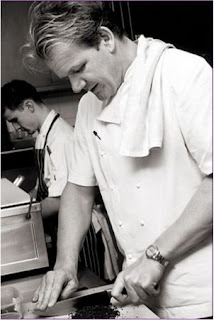
Since I won't be able to work in the michelin star rated restaurants that Gordon Ramsay has worked in. I'll learn from the experiences he's shared with us through his various shows and books and apply them to my kitchen. So far here is what I have learned.
Humble Pie Autobiography
- What makes a three-starred Michelin restaurant? Consistency. Every night must be the same performance-wise.
- I think customers prefer their restaurateurs, as they do their chefs, to remain discreetly in the background.
- The location of your restarant decides a menu, not your cookbooks.
- There are a lot of chefs who are waiting for medals and acclaim, but don't give enough attention to anything to do with the customer. No one should ever forget that, no matter how great their sauces are.
- You can use a book for inspiration - especially some of the older books, like Escoffier and even Elizabeth David, who's absolutely inspirational - but you can't learn to cook from books. That's impossible. There has to be some natural flair.
- We need to get closer to what we eat, to scrutinize it more, to love it and pay it attention.
- Cooking is not like being left handed, or being able to roll your tongue. It's a fucking skill, learnt like any other.
- There is no point in paying too much attention to negative personality stuff. What counts is the cooking.
The Glass House Episode
- never let your mistakes leave the kitchen
- if the chef is not inspired any inspiration the brigade might have will just dwindle away
La Lanterna Episode
- the kitchen should be immaculate after service
- a good manager will stagger the bookings to keep a steady flow of orders coming into the kitchen
Momma Cherries Episode
- if you want to run a business then the terms 'laid back' and 'professional' just don't mix.
- be on time, "if you turned up half an hour late in my kitchen, trust me you'd be home for the day looking for a new fucking job."
- like a beautifully risen cake, successful restaurants only thrive when 3 keys business factors are working in close harmony: 1/3 staff and overhead costs, 1/3 food costs, 1/3 gross profit. Combining all those ingredients into one recipe is how any good business works.
- it's not just about how good the food tastes. Its about how it fucking gets there as well and that is crucial.
- last table goes out just like the first table.
La Riviera Episode
- don't fuck with things that are good. When you got quality ingredients let them speak for themselves.
- sometimes less is actually more, if you have good ingredients do not muddle them with extra flavours.
- everything that goes on the plate has to have a reason, not for the eyes but for the palette.
- Smile... We're supposed to be a restaurant not a Sunday school church service.
- michelin inspectors never reveal their criteria, but I know from experience that beautifully cooked food is not enough. Inspectors look for good quality ingredients, ideally regional and definitely in season and the balance of flavours is crucial.
- first and foremost don't confuse a michelin inspectors palate by putting too many ingredients on a plate. The simpler the better.
- don't garnish plates unless the garnish itself makes sense and is edible.
- make sure the customers are going to be happy with every dish that you ever make them and things like stars from the michelin guide will follow.
- simple can also be special.
- if you get up towards 11 things on one plate call Gordon Ramsay so he can come and kick your arse ... Keep it simple.

Whether you like his tactics or not you can't argue his success. He has 9 michelin star rated restaurants collectively amounting to 10 michelin stars.
His principles on running a successful restaurant/kitchen are sound.
Give them a try and see for yourself.
To be continued ...

No comments:
Post a Comment